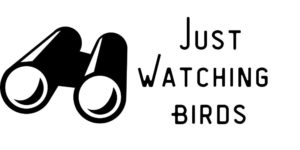As an Amazon Associate, we earn from qualifying purchases with no additional costs for you.
What do baby birds eat? If you’re a bird watcher or hang a bird feeder in your backyard, spring may make you wonder how to make sure baby birds are fed. The good thing about baby birds’ diets is that their parents know exactly how to feed them.
Baby birds eat special food to help them grow big and strong. Most baby birds eat bugs, worms, and tiny insects as these foods have protein that helps their muscles get stronger. Some baby birds eat fruits and seeds or crop milk, which contain the vitamins and minerals that make them healthy.
The way baby birds get their food is different – some get it directly from their bird parents, and others eat food that their parents bring back and give to them. Understanding what baby birds eat helps us make sure they get the right kind of food to grow up happy and healthy.
TIP: If you want to check out the best pair of binoculars for bird watching, we recommend a pair of waterproof and fog-proof 8 x 42 binoculars like the Celestron – Outland X 8×42 Binoculars (Amazon link).
What Do Baby Birds Eat?
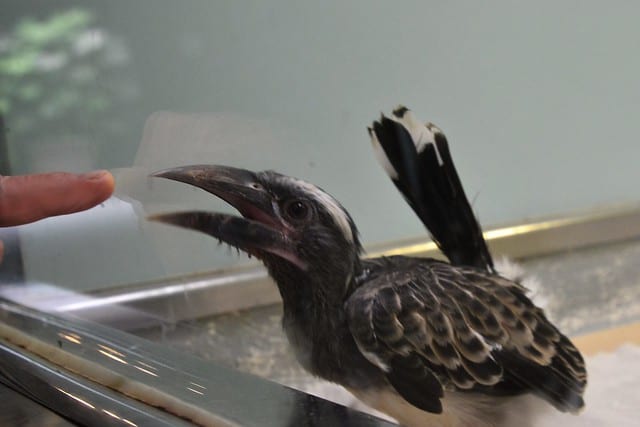
Baby birds need high protein, but the exact type of food is different depending on the bird. And, baby birds’ diets are as varied as the number of bird species, of course! But for songbirds in your backyard, the answer is that they eat whatever their parents give them!
Some birds, like waterfowl, are born ready to go and find food as soon as they can. This is often within hours of hatching! But a lot of your common backyard birds are born featherless and vulnerable, requiring their parents to care for them. Adult birds will bring food to their chicks until the chicks are ready to leave the nest.
Baby Bird Diets in the Wild
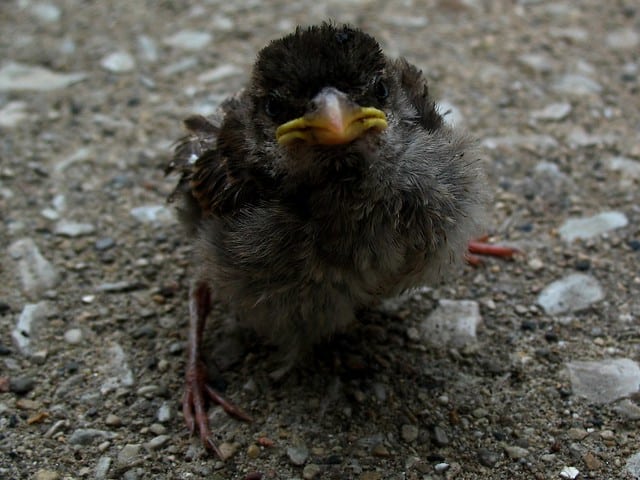
What do baby birds eat in the wild? Just like human babies, the most important thing is that baby birds have a ready supply of nutrients.
For many birds, this involves feeding their chicks protein in the form of insects, fish, and meat. This is true even for baby birds that will primarily eat seeds, nuts, or other plant parts later in their life. Parents will often gather insects to feed to their chicks even though they would not eat them themselves.
But even this varies by species. Certain birds feed their babies a substance known as crop milk, a protein-rich substance that the birds make and regurgitate into their babies’ mouths. Crop milk is found in birds like the flamingo and emperor penguin, but it’s also common closer to home. Pigeons and doves also use crop milk to feed their young.
There’s not one easy answer to the question of what do baby birds eat. But for the most part, their diet is often protein-rich and usually very different from that of their parents.
TIP: Are you looking for high-quality food for wild birds on your backyard? I recommend using Wagner’s products with the highest quality grains used in blending and made in the USA (Amazon links):
– Deluxe Treat Blend Wild Bird Food
– Eastern Regional Wild Bird Food
– Western Regional Wild Bird Food
– Midwest Regional Wild Bird Food
– Southern Regional Wild Bird Food
At the Bird Feeder
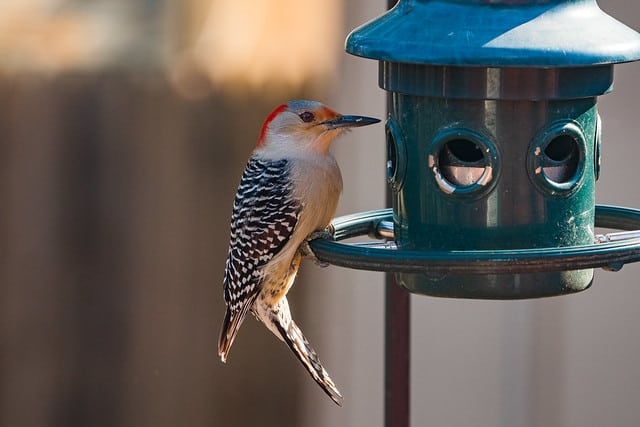
This raises the question: What do baby birds eat when they leave the nest? Do they still rely on the protein that they could get from insects, or do they switch to birdseed instead?
If you keep a bird feeder in your backyard, you may be looking for a way to help baby birds grow. Whether you’ll be able to feed young birds or not depends on what age you target. Certain young birds will be able to eat the birdseed you provide, although you may want to change what you stock and where you put your feeder.
Can a Baby Bird Eat Birdseed?
If you care about the birds that come to your backyard, chances are you’re worried about their chicks as well. No doubt you want to offer something they can take back to the nest so they can maintain their brood.
Sadly, most baby birds cannot digest birdseed. And even if they could, the nutrients in birdseed and nuts are not enough to help them grow big and strong. But providing an easy source of food for their parents frees up time they can spend supporting their chicks.
Stocking the Bird Feeder For Young Birds
While nestlings, the little featherless baby birds that still live in the nest, cannot eat birdseed, older birds still can. Plus, there are ways to stock your feeders to encourage baby birds to visit.
One popular type of feeder is a suet feeder, which comprises a block of fat hung from a cage to encourage birds such as woodpeckers to visit. Woodpeckers often bring their offspring to suet feeders, and the rich fat is nourishing to baby birds. A mixture of peanut butter and cornmeal is a worry-free, warm-weather alternative.
Since baby birds need protein, you can also stock your feeder with mealworms to encourage them to eat their fill. When you stock mealworms in your feeder, make sure to add plenty of food for the worms as well. Healthy mealworms make for healthy birds.
Of course, no matter what kind of feeder you use or how you stock it, nestlings will never be able to go to a feeder on their own. Fledglings that have learned how to fly will be the only baby birds you’ll see visiting.
TIP: Choosing the right bird feeder is crucial when you want to attract birds on your backyard. There are a lot of options on how and where to place a bird feeder. Check out my picks on different bird feeders below (Amazon links):
– Free-standing Bird Feeder
– Hanging Bird Feeder
– Bird Feeder with Camera
Caring for Baby Birds Yourself
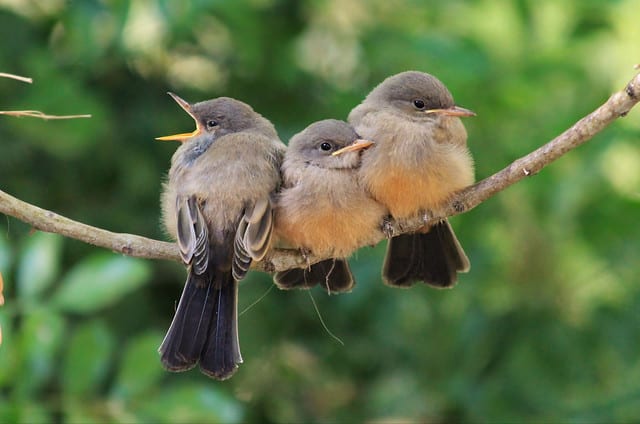
If you’ve found a baby bird on the ground, you may have a different reason for asking, “What do baby birds eat?”
Caring for a baby bird doesn’t have to be scary, but it also isn’t always necessary. The baby bird you think is abandoned may just be at a natural stage in life where it is out of the nest but cannot fly. We’ll help you identify these birds and know what to feed them if they do need it.
Knowing When a Bird Needs Rescuing
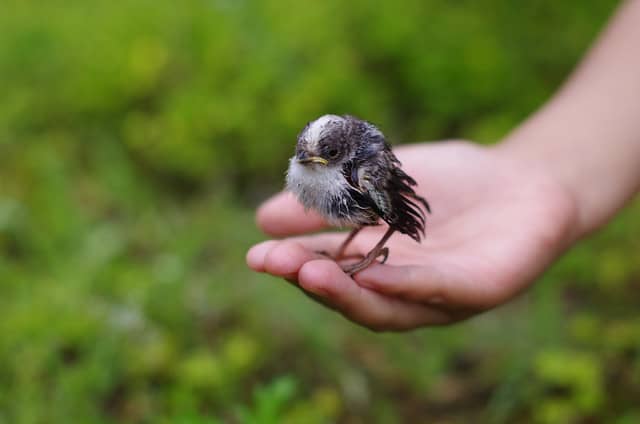
Baby birds may seem helpless, but their parents aren’t. Instinct is a powerful driver, and you should trust that adult birds know how to care for their babies without needing to look anything up!
Before you bring a baby bird inside to care for it, we have a few recommendations to make sure that any lost birds truly need your help.
Nestling Birds
Nestlings are probably what most people think of when they picture baby birds. These are the featherless, pink babies that thrust their beaks up and wait for food.
If you see a nest of these on the ground, chances are you’ll want to take care of them, or at best leave them alone. But in reality, the best option is to make sure they get back into their nest safely. Don’t worry about that old myth that mother birds abandon their young if they smell people on them, by the way. It’s just not true.
When you find a nestling on the ground, first try and locate the nest it fell from. If you can find the nest, return the bird carefully. If the nest is dropped or damaged, use a plastic container to recollect the nest and secure it to the tree closest to where you found the baby bird.
Fledgling Birds
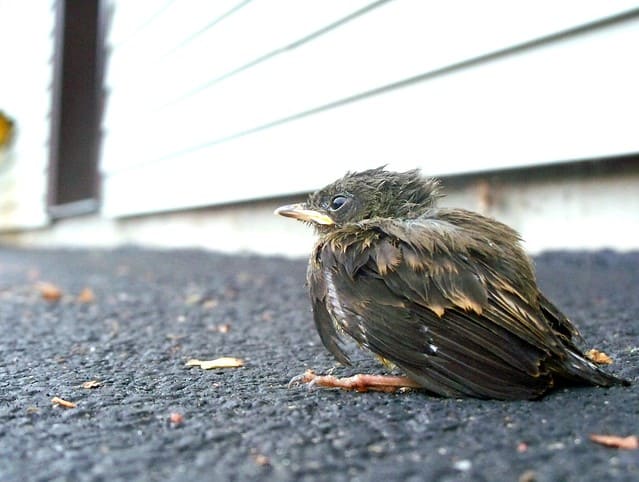
Often, baby birds grow too large to remain in the nest but still cannot fly. At this point, these birds are fledglings. At this age, birds learn to forage for themselves and hide from predators. They also learn to fly.
If you see a baby bird on the ground that can move and has feathers, chances are it’s a fledgling. Fledglings are rarely left unattended by their parents for long, so consider this when you find one.
The United Kingdom’s Royal Society for the Protection of Birds recommends leaving the area and watching from a safe distance. Move the fledgling to a safe area if it’s in danger, such as in the road, then step away. A parent bird will likely be along to care for their chick before long.
TOP TIP: Sometimes a bird nest can be destroyed! What do birds do if their nest is destroyed, and what can you do to help? Find out here. This article has great recipes for making birdseed ornaments that your garden birds will love! A great activity to enjoy with your children or grandchildren!
How to Feed a Baby Bird You’ve Rescued
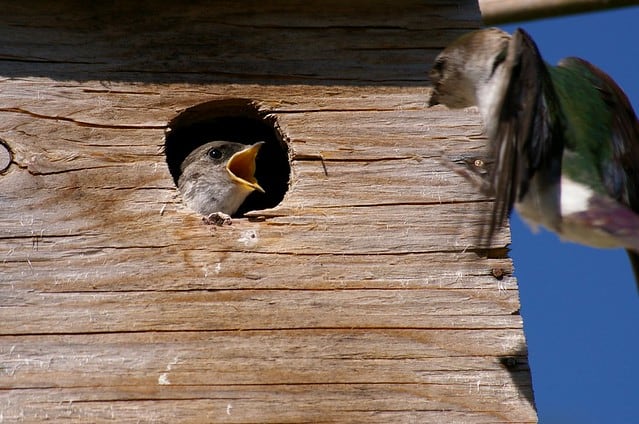
In some scenarios, it’s still necessary to care for a baby bird even after you’ve gone through all the steps above. In this case, you’ll definitely be wondering, “What do baby birds eat?”
It’s probably not easy to get a hold of insects on short notice, but there are a few protein-rich alternatives that you probably have on hand.
Moistened pet food is probably the first thing you’ll be able to find. Wet dog food or moistened dry food is a good emergency go-to. Hard-boiled eggs and raw liver have similar protein content and texture. Anything you feed a baby bird should be soft and wet but not dripping, as this could drown the bird.
Under no circumstances should you feed the baby bird worms or bird seed.
Use this table as a quick guide to feed a rescued baby bird:
| Type of food | Examples |
| Protein rich foods | Insects (ants, caterpillars), worms, larvae |
| Fruits | Berries, apples, pears |
| Soft food | Dog or cat food |
| Eggs | Hard boiled or crushed eggshells |
| Mealworms | Live or dead |
| Vegetables | Finely chopped leafy greens, carrots, peas |
Anything you feed it should be a temporary solution until you can get the baby bird to a rescue, where they will be able to care for it properly. Don’t try to nurse the bird yourself. The best thing you can do is get it into professional care.
Nurturing the Next Generation of Birds
If your reason for asking what baby birds eat is so you can take care of them yourself, please take away this:
Adult birds are far better at taking care of their babies than you will ever be, and chances are the birds you’ve found are not actually in danger. Whether they have fallen from the nest or are fledglings on the ground, the best thing you can do for a baby bird is to leave it where the parents can get to it. Only if you’re positive it has been abandoned should you try to rescue it.
When being cared for by their parents, baby birds have diverse diets that are rich in protein. Even when we try to feed them with mealworms or suet, they lack the nutrients baby birds require for growth. Whether on their own diet of insects or from specialized crop milk, parent birds are the best equipped for caring for their young.
Just like we love observing adult birds in their natural habitat, we should trust the natural process. Observing baby birds is a rare treat, but trying to feed them could end up doing more harm than good.
Have you had the pleasure of having a nest of baby birds in your yard to observe? Tell us about it in the comments section.
